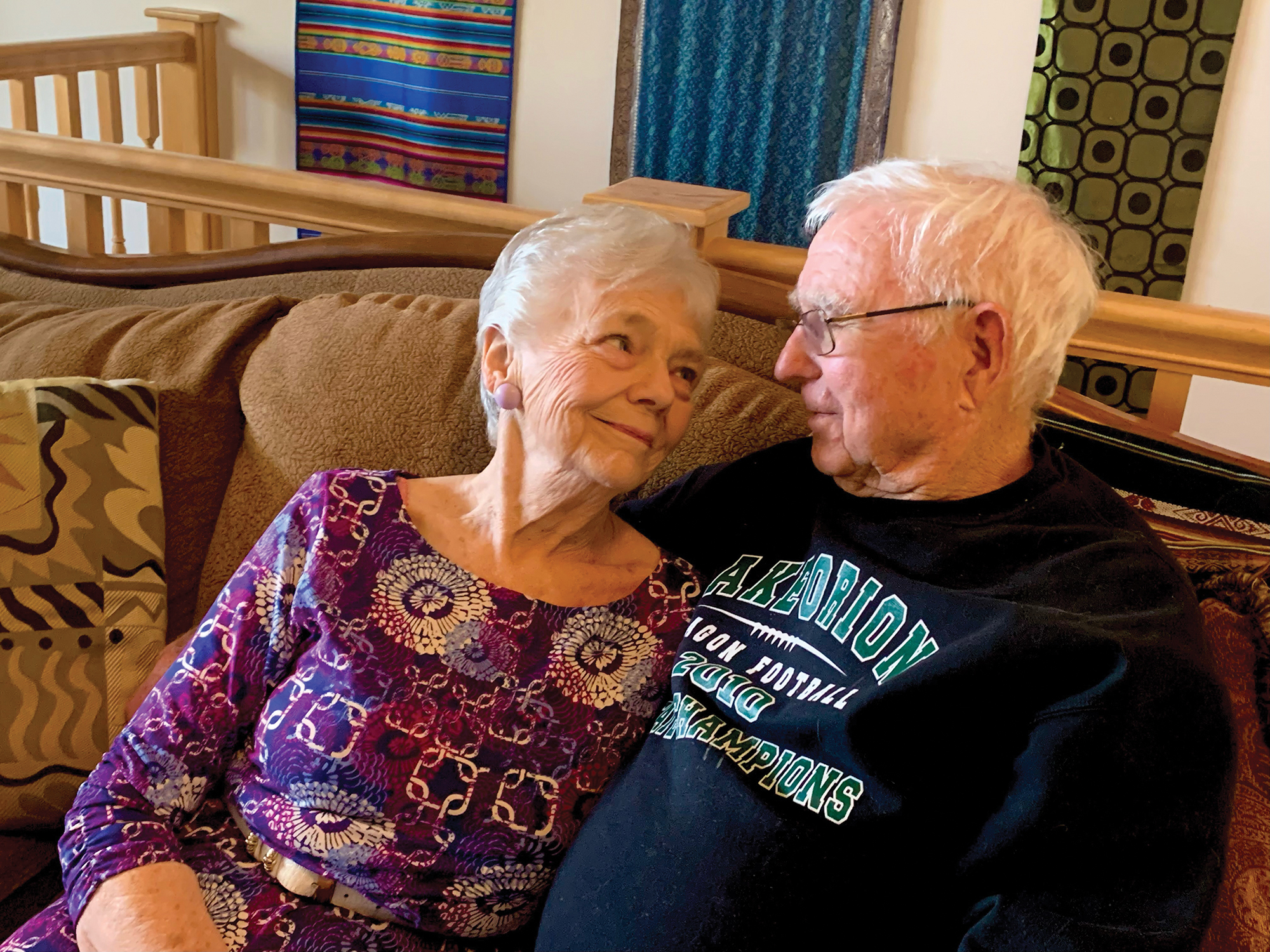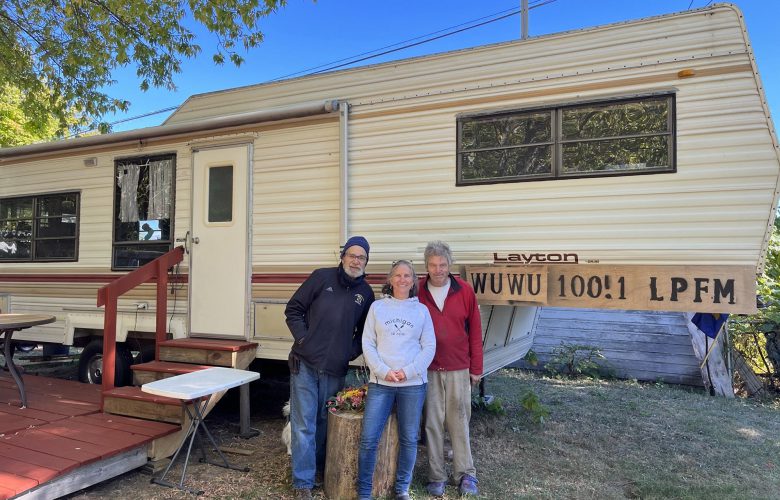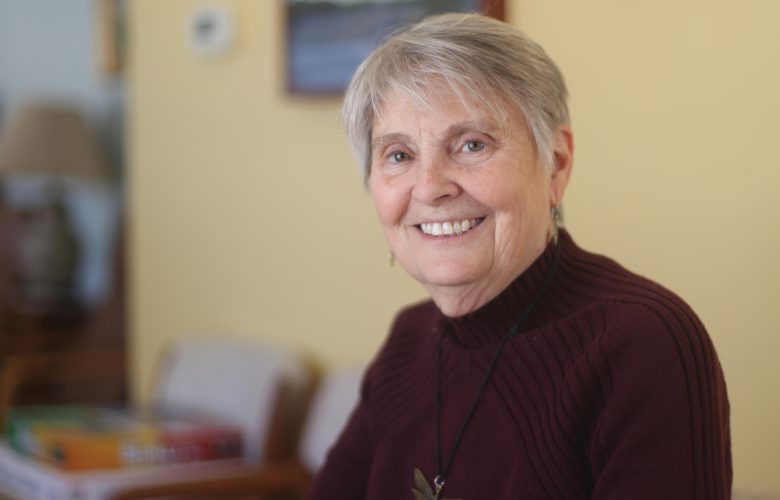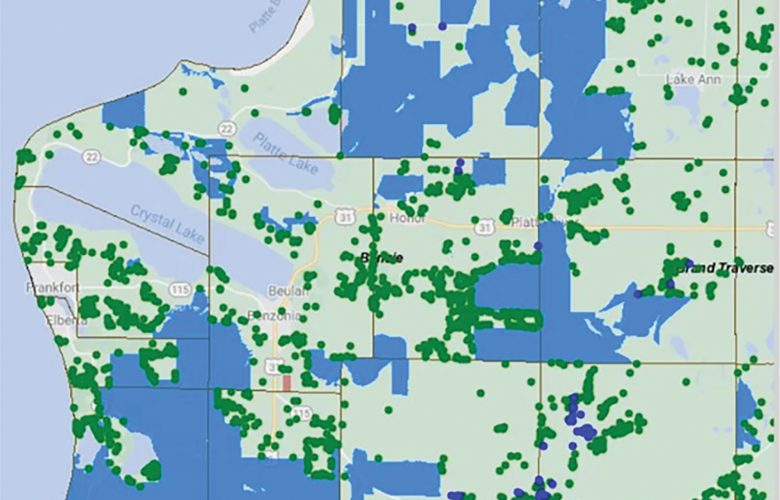Dodie Toman and Fred Snow make a commitment
By Keith Schneider
Current Contributor
Dodie Toman, who lives across the street from us in Benzonia, came to our house on a mission the other day. First, to gift us with a fresh-baked lemon meringue pie. And second, to explain her virtue as a practitioner of old-school dating principles.
“You know when we told you about the first time I stayed over at his house? Well, he was a perfect gentleman. And I was a proper Methodist lady,” she said. As she was leaving, Dodie emphasized the point. “I had on my flannel gown, up to my chin and down to my toes. He stayed on his side of the bed. I stayed on mine.”
In this free-wheeling, hyper-sexualized, privacy-shattering, tell-all, social-media era of conjugal antics, the image of Dodie Toman and Fred Snow—newly dating with righteous probity—was simultaneously comical and comforting.
Just a few hours before, Dodie and Fred had sat for an interview about their lives, their relationship, and their decision to marry in September. Several data points prompted my interest. She’s 80 years old. He’s 87. Both are in their third marriages.
It’s not that typical. The U.S. Census data finds that eight percent of men and six percent of women over the age of 70 are in their third marriages.
There’s also good reason for people experienced in marriage to be really careful. Anybody who has been married, even once, knows that a commitment of this enormity is an invitation to discovery and delusion, proximity and estrangement, comfort and calamity.
The geography of their lives, as I anticipated, is rich in experience—marital and everything else. We covered a lot of territory in the interview, including the bedroom.
“We are very fortunate to have found each other,” Dodie said. “We’re not alone anymore. You know, we’re together. Last night, we went and played cards with friends. On the way home, he said to me, ‘Had I not met you, I’d be driving home by myself.’”
Fred then said:
“It’s so nice to have a loving, caring person. We do love each other. It’s a whole lot better than being alone.”
And that, I learned, is the emotional texture of their marriage. A bit of levity. A lot of love, grace, and companionship. All were achieved by the opportunities afforded in an unanticipated relationship that ripened very quickly.
Good Neighbor and Friend
Dodie has lived across the road for nearly a decade now, and while we leaned on each other the way that good neighbors and friends do from time to time, we had never reached a stage of familiarity that deeply explored her background, or mine. The interview revealed more details.
Dodie was born in Chicago and, with her family, moved to Charlotte, southwest of Lansing, when she was 10 years old. She married Keith Garity, her high school sweetheart, who she describes as a nomad and a skilled craftsman, builder, and laborer. About half of her 43-year marriage to Garity was spent in northern Georgia, where she raised their four children and worked as an office manager and secretary. At the start of this century, they moved to Thompsonville, one of Benzie County’s six villages. Keith died in 2002.
Meanwhile, Fred was born in Jackson, Michigan, where his father was an electrical engineer. One of four boys, he started his college education at Michigan State University, then transferred to Central Michigan University to join a younger brother. Central was a teachers’ college at the time, so he became a teacher. He began his career in the Lake Orion School District, northwest of Detroit, where over the next 30-plus years, he moved quickly up the ladder from teacher to principal to district superintendent. In 1990, he and his first wife, Joanna, retired to a home they owned in Frankfort.
Both Dodie and Fred, I learned, are experts in loss and loneliness.
Between them were two long first marriages, that ended in untimely deaths, and two shorter second marriages, which also were cut short by terminal illnesses. When Kurt Toman, Dodie’s second husband, died in 2019, she was over at the house and told me, “I’ve buried two husbands. I can’t bury another. I just can’t.”
During the next three years, Dodie lived a quiet life of family, friends, dancing, playing cards, and attending services and events at the United Methodist Church in Frankfort. She worried about her financial situation and being forced to move from a house she might not be able to afford. That threat subsided when one of her granddaughters moved into the ground floor along with her husband and son. They stayed a year.
Stories are about structure—timing, place, and people. So here are three more important details.
Last fall, I was out making our garden ready for winter, when Dodie wandered over and told me that a man was coming to pick her up for an event. She didn’t mention his name. I didn’t ask.
Early last winter, my wife, Gabrielle Gray, and I were in the kitchen when Dodie knocked on the door, all smiles and quivering like a schoolgirl. She sat down and smiled at us, her eyes shining. “I’m seeing somebody,” she confided. “I’m so happy.”
In February, as I recall, a white Ram 1500 pick-up truck showed up in Dodie’s driveway in the afternoons. One morning, however, it was still there. I don’t remember when we met Fred who, we gradually recognized, was a Michigan man, straight out of central casting—sturdy, smart, heartfelt, a career educator, a hunter and fisherman who can swing a hammer or crank a wrench to fix or build damn near anything.
Incrementally and quite perceptibly, Dodie began experiencing a succession of transformations. When we crossed paths, her mood was brighter. Her appearance changed, too. Always a pretty woman, she became beautiful. A degree of contentment and security had settled in her. She had fallen in love.
Dodie and Fred knew each other from church.
“I’ve been going there for about 20 years,” Dodie said. “Fred met one of our ladies there, and he married her five or six years ago. So that’s how I knew Fred—I knew his [second] wife, Joanne. We did church activities. Played cards and other stuff together. Then my husband died in 2019. Three years later, his wife died.”
That was in September 2022.
“Shortly after Joanne died,” said Dodie, “one of our friends called and said, ‘Would you like to play Euchre tonight? We’re missing one person.’ And I said, ‘Sure, but I don’t know where you live.’ And she said, ‘Fred will pick you up.’So Fred came over and picked me up, and we had a chance to talk a little bit. He said, ‘How do you get past this? It hurts. How do you get over this?’ I said, ‘You just keep busy Fred. That’s all you do. You just keep busy.’”
A seed was planted. It flourished over the next few months.
“The next time we saw each other was probably at church,” Dodie recalled. “You were talking about how you needed apples to go hunting. I said, ‘I have apples. I’ll drop them off at your house.’ And I did.”
That was November, deer season. Fred sat still and silent in his blind thinking about Dodie.
“She knew that I baited deer with apples,” he said. “She got some apples for me, and one day at church, she came up to me and she said, ‘I’ve got some apples for you.’ And I said, ‘Gosh, I really don’t need them. I’ve been getting apples out in an orchard, and I don’t need them.’ Well, I went hunting that evening. And I asked myself, ‘Am I blind?’ I said to myself, ‘I was rude to her.’ I’m not a rude person. She went to the trouble of picking those apples and walking up to me and asked me if I wanted her apples. I said, ‘No.’ You think of a lot of things, waiting for a deer to come. Anyway, I left my blind and came over to Dodie and apologized to her for being rude.”
Their relationship gathered strength after that. Lunch dates in Frankfort. On New Year’s Eve, they watched the University of Michigan lose to Texas Christian University in a semifinal college football playoff game.
To people who have lived as long as Dodie and Fred—two adults engaged in four previous marriages between them—there is no mystery about the institution. They know all about the sacrosanct principles that make marriages work: patience, trust, collaboration, communication. They know more than most about trial and pain.
What is enlightening about Dodie and Fred’s relationship transcends that.
It’s about the merger of need and possibility, the strength that comes with strong bonds, built of shared experience. In simpler terms, Dodie and Fred know precisely what they are doing, because of who they are and where they have been.
On Superbowl Sunday, two days before Valentine’s Day earlier this year, they spent the night together at Fred’s house in Frankfort. The next morning, Dodie gave Fred a ride to the airport in Traverse City, where he caught a flight to Florida to meet his three brothers.
“I promised to be a perfect gentleman, which I was,” Fred said.
Dodie remembers it this way:
“He invited me to come over and watch a football game. I said, ‘Oh, I hope that doesn’t come on too late, and it’ll get me home real late.’ He said, ‘Might I make a suggestion?’ I knew he had guestrooms there in the house. He said, ‘You could pack a little bag and spend the night.’ I said, ‘Okay, I’ll think about it’ I went over there, and he said, ‘Did you bring your nightgown?’ I said, ‘Yes. It’s up to here,’” she said, pointing to her chin, “‘and clear down to the floor.’ I got ready for bed, and he said, ‘I put all new linens on. I changed the beds and everything.’ And I said,’ Okay, where do I sleep?’ I can still see him standing there. He said, ‘With me. In my bed.”
She continued:
“I took a deep breath, and I thought, ‘Okay, am I ready for this?’ He said, ‘I’ve got pajamas, I’m going to wear pajamas.’ I had my nice long flannel nightgown on. You couldn’t see through it or anything. We spent the night together, and the next morning we got up and had coffee and waffles. I had to take him to the airport. And I did not want to take him to the airport. I remember, I thought, ‘Oh, I’m gonna miss him. I’m gonna miss him.’”
Fred shared that sentiment:
“The romance kind of blossomed over the phone while I was in Florida. I proposed to her over the phone, long distance.”
“I said I would marry you tomorrow if you were here,” Dodie said.
Fred continued:
“I was supposed to spend four weeks in Florida. At the end of three weeks, I called the airport, changed my flight, and came back. By that time, I had been calling her morning, noon, and night. When I came back from those three weeks in Florida, we decided that we were going to get married. But then the complications—the complexities of finances and all that stuff—made us decide we better, probably, just do it a little differently.”
Commitment Decision
After learning from an attorney that a marriage under the law invited deep financial risks from a long illness if Fred and Dodie merged their assets, they decided to marry with a ceremony of commitment.
Dodie jokes that “we’re shacking up.” I laugh every time she says it, always with a slight smile on her face. It’s a visible nod to her lifelong devotion to Methodist conventions, coupled with this thought going through her head: ‘What would my mother say?’ Fred doesn’t utter a word. He’s sure he and Dodie are on God’s good side.
Dodie and Fred held their wedding event—what retired Method Pastor Jim Boehm dubbed “a covenant of love”—on September 2, 2023.
Fred’s daughter, Gail Tomko, organized a luncheon for their families and friends. On a bright and sunny late summer afternoon, Dodie’s and Fred’s families and friends filled White Owl Hall on the shore of Lower Herring Lake in Benzie County.
No wedding comes without drama, though.
A bit erupted in Fred’s family over an unwritten but apparently powerful rule about timing. After Fred announced their engagement, there was chatter.
“Some didn’t take it well,” he said. “They thought it was too soon. It was six months after my second wife had passed. The one who objected the most strongly was Joanne’s first granddaughter, her first grandchild. She was very close to her grandmother. She just thought I was not, perhaps, honoring her with a proper distance between the relationships.”
He continued:
“Joanne died of leukemia. She was told right up front that it was terminal. She lived another 15 months, so we had time to talk about a lot of things. She made it very clear to me that she wanted me to get on with my life. We know what that means—maybe meet another person. We both agreed we shouldn’t be alone.”
Fred and Dodie were unimpeded by the resistance.
“There was a suggestion to wait for a year,” Fred said. “When you’re 87, one year may be 75 percent of the rest of your life.”
Precisely. Fred’s pact with Dodie was fresh, powerful, and urgent. There was no reason to wait. Fred’s children supported the marriage. Dodie’s family was thrilled. As the commitment celebration approached, the chatter subsided. And afterward, Dodie received a sweet note from Fred’s family.
Marriage in your 80s. It works.
“We enjoy the same things,” Dodie said. “We watch the same things on TV. We love each other.”
Featured Photo Caption: Dodie Toman and Fred Snow married in September 2023. Photo by Gabrielle Gray.





I always love your content!!!!! Thank you!
While “only” in our 70’s, my husband and I have a similar story! We knew each other 60 years ago, and after both of us losing our spouses, reconnected and got married at The Cherry Hut, September, 2022, in the beautiful gazebo outside, with a wonderful luncheon there afterwords. We, too, have maintained separate finances and identities, and enjoy the “2nd Chance” of life and love we’ve been given!